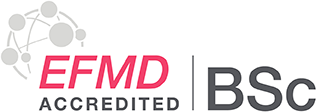Business Administration / Marketing Communication and Digital Marketing

Are you interested in marketing communications, digital marketing strategies, advertising, brands and media? Do you enjoy strategic and creative thinking? Do you want to understand why certain communication strategies work and others don’t? Then the Marketing Communication and Digital Marketing study program is the right choice for you.
As a marketing communications expert, you will develop integrated marketing and communications concepts and plan brand building and brand management by using marketing communications tools in a coordinated way. Embedded in a thorough business education, we will provide you with the necessary knowledge of marketing and communication as well as closely related fields such as consumer psychology, market research and relevant laws.
We give you practical insights into classic and digital marketing and communication approaches such as strategic planning, customer experience, advertising, social media marketing, content marketing, influencer marketing or storytelling and pay attention to current developments such as environmental and social sustainability in marketing communication.
At a glance
Prerequisites
The entry requirement is a higher education entrance qualification. Good English language skills are essential. Non-native speakers must prove sufficient knowledge of German.
Contact
If you have further questions regarding our study program or the application procedure, please do not hesitate to contact us: markom(at)hs-pforzheim(dot)de, Tel.: 0049 7231 28-6075
Program
What you will learn:
- Strategic marketing management, marketing mix, digital marketing
- Communication management and customer experience management
- Classic and digital instruments, e. g. advertising, social media marketing, search engine marketing, public relations Consumer behavior and advertising psychology
- Empirical marketing and communications research Data analytics and performance marketing
- Basics of design and production of advertising media (moving image: video, reel & co., graphics/layout, Instagram content creation, website conception)
- Projects with clients from the field Sustainability in marketing communication
Benefits
Application-oriented knowledge is the recipe for success of our degree program. In addition to the professors, competent professionals, e. g. from renowned communications agencies and companies, are available to you as lecturers. Project work, case studies, excursions and the internship semester are an integral part of the program. You can gain further practical experience by working in our student agency "werbeliebe e. V.". Marketing communication has a strong international focus. During your studies, you can therefore also take advantage of our excellent network of international partner universities for a stay abroad.
The degree program consists of general studies and course specific modules. After completing the business basics, students consolidate their studies through learning about how to develop marketing and communication concepts. This also includes integrated planning, the deployment and control of traditional and new instruments of communications policy as well as other marketing instruments (product, price, distribution policy). Besides a very specialized training, students will also be introduced to subjects such as market research, competition law, production and design of advertising media and learn more about creative partner disciplines such as text design, photographic design, desktop publishing and film/radio/TV.
Course specific modules:
- instruments of communications policy, for example classical advertising, direct advertising, sales promotion, public relations, sponsoring and event marketing
- new media, especially online media and e-commerce
- marketing management and political marketing instruments
- advertising psychology
- market research
- competition law
- basics in design and production of advertising media (print, radio and film)
- advertising texts, advertising photography or desktop publishing
- projects with clients from the industry
- internship in renowned agencies and companies
It is essential to provide our advertising students with a strong practice-orientation to their studies. They are given a wide variety of practical opportunities. We employ managing directors from renowned advertising agencies to give lectures on practice relevant issues and current topics. As well as gaining more academic knowledge imparted through lectures, our students are encouraged to extend their knowledge through the many practice oriented tasks. These are carried out through real projects for business companies, case studies, excursions to advertising companies and agencies as well as the invitation of renowned practitioners as consultants for an interchange of ideas. Furthermore internships are an integral part of the course and give our students a direct insight into their future careers.
Work experience can also be gained by taking part in our student advertising agency: werbeliebe e.V. (www.werbeliebe.de).
Our students also have the opportunity to spend a semester abroad at one of our many partner universities in order to broaden their horizons.
We provide our students with technical facilities like computer, photo and video studios as well as many PC/MAC computers and a media test laboratory. These facilities are used to gain more knowledge and also to work on practical applications.
The first half of the study program of general studies will cover the following modules:
- General Business Administration
- Company Taxation
- Business Information Systems
- Mathematics, Statistics and Operations Research
- Economics
- Law
- Intercultural Competence
- Ethics and Corporate and Social Responsibility
Would you rather work for an agency or for a company? Go into marketing consulting, strategic planning, marketing, brand or product management – there are so many options open to you. The excellent reputation of the program and the outstanding relationships with the marketing, communications and media industries will make it easy for you to successfully start your career and advance to management positions.
Program goals describe the competencies, which every student should have obtained at the end of their studies at Pforzheim Business School. Each one of these goals is outlined by learning outcomes, through which the competency goals are operationalized and become tangible.
You can find the program goals and learning outcomes of the various study programs in the navigation bar.
Goal at degree program level
Students have broad knowledge of theories and their practical application in order to understand business functions and processes. Expert Knowledge
Learning Objective/Outcome
1.1 Students demonstrate their distinguished and sound competencies in General Business Administration.
1.2 Students demonstrate their distinguished and sound competencies in Economics.
1.3 Students have command of legal methodology for case solutions on basis of claims.
1.4 Students are able to solve business problems based on profound data research skills and by applying quantitative methods.
1.5 Students have profound expert knowledge in their field of specialization.
Goal at degree program level
Students are able to use information technology successfully. Digital Skills
Learning Objective/Outcome
2.1 Students know and understand relevant IT software tools used in business and their features and have a solid understanding of digital technologies.
2.2 Students are able to effectively use and apply information systems to develop solutions in business settings.
2.3 Students are able to effectively use digital technologies to interact, to collaborate and to communicate.
2.4 Students handle the professional use of digital technologies in a responsible manner.
Goal at degree program level
Students demonstrate profound analytical and critical thinking skills. Critical Thinking and Analytical Competence
Learning Objective/Outcome
3.1 Students are able to implement adequate methods in a competent manner and to apply them to complex problems.
3.2 Students are able to critically reflect and interpret findings and to develop comprehensive solutions for complex problems.
Goal at degree program level
Students recognize issues and conflicts in the areas of ethics, sustainable development and social responsibility which can arise from economic and business activities and account for them accordingly. Ethical awareness
Learning Objective/Outcome
4 Students are able to develop sound strategies in the area of ethics, sustainable development and social responsibility and are able to apply them to typical economic decision-making problems.
Goal at degree program level
Students are able to express ideas and arguments clearly and convincingly in oral and written communication. Communication and Collaboration Skills
Learning Objective/Outcome
5.1 Students are able to express complex issues effectively in writing.
5.2 Students demonstrate their oral communication skills in presentations.
5.3 Students show that they are able to work succesfully in a team by performing practical tasks.
Goal at degree program level
Students are well-prepared to act successfully in a global business environment. Internationalization
Goal at degree program level
6.1 Students are able to understand and explain busienss challenges in an international context.
6.2 Students demonstrate that they can articulate themselves in a professional manner in international business.
6.3 Students successfully demonstrate awareness of cross-cultural differences.


